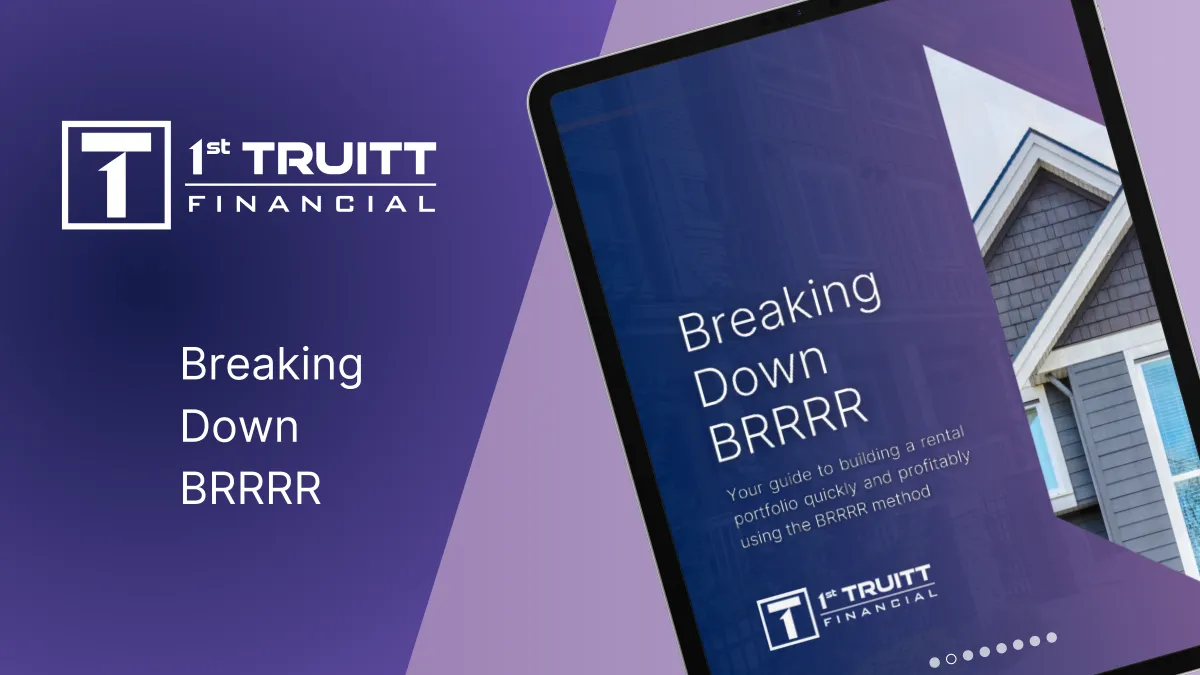(770) 525-7114
LEARNING CENTER
Explore the latest on real estate investing, hard money lending, and more.
FREE EBOOKS

Flipping 101
Complete A to Z on how to flip homes. From how to find the perfect property to selling it for the most profit possible. This 6 part series has everything you need to know.

Breaking Down BRRRR
Step by step, everything an investor needs in order to properly start their real estate portfolio. Buying, Rehabbing, Refinancing, Renting & Repeat. Get your copy free today!

Flipping 101
Complete A to Z on how to flip homes. From how to find the perfect property to selling it for the most profit possible. This 6 part series has everything you need to know.

Breaking Down BRRRR
Step by step, everything an investor needs in order to properly start their real estate portfolio. Buying, Rehabbing, Refinancing, Renting & Repeat. Get your copy free today!
BLOGS

How To Prepare For a Fix-&-Flip Loan
If you are thinking about investing in property flipping, there are a few things that you should keep in mind. One of the most important things is that it requires a significant capital investment upfront. A fix-and-flip loan is a great way to get the capital you need for a good return on your investment.
Let’s take a look at the things you should keep in mind to prepare for a fix-and-flip loan.
Have a Property in Mind
Fix-and-flip loans require you to choose a property before you begin the loan process. Choosing the right property for your project helps ensure your investment is productive and profitable. If you're just getting started with flipping houses, it's wise to avoid purchasing a home that needs repairs to the foundation or other major structural renovations, as these can easily turn into cost over-runs for a new real estate investor. In addition, it's smart to choose a home that is fairly similar in size to other homes in the neighborhood, which will usually allow for faster resale upon completion.
Plan your Project Budget
Before you apply for a fix-and-flip loan, it's essential to put together a project budget and scope of work for the property you plan to purchase. Have the home carefully inspected so you know exactly what you're purchasing. Then, create an itemized list of all the renovations you plan to do. This itemized budget helps with your planning, and it's essential for providing lenders with important information about your project.
Estimate How Much the Property Will Sell For
When you apply for a loan, you'll need an accurate estimate of what the property will sell for once you've completed all the repairs and renovations. This is called the after-repair value, or ARV, and knowing it ahead of time is an essential part of securing a fix-and-flip loan. In general, lenders can provide up to 85% of the purchase price and 100% of the renovation costs, but they usually limit their loan to 90% of total purchase and rehab costs.. This estimate can help you determine whether fixing up a house makes sense for you.
Ensure Your Investment is Profitable
Knowing the ARV can also help you ensure that your investment is profitable. With any home renovation, there can be unexpected expenses that crop up as you proceed with the repairs, so it's important to ensure you have enough of a buffer to make a profit even if something unexpected happens. Wise investors use the 70% rule, which suggests that the purchase price of the property should be less than 70% of the after-repair value minus the cost of repairs. For example, if you expect to sell the repaired home for $300,000 and repairs will cost you $50,000, you should take $300,000x.07-$50,000 to estimate your initial purchase price. In this example, it would be best to pay no more than $160,000 for the property initially. In addition, you'll typically need to have about 20% of the initial purchase price to use as a down payment.
Know What You Are Putting into the Project
Fix-and-flip loans are beneficial for borrowers because they allow you to purchase and renovate a home that you might not be able to afford with only your cash and to pay it off in one amount after you sell the home. However, a fix-and-flip loan does require some investment on your part, so it's important to understand what you will put into this type of investment. Experienced investors with a good portfolio of flipped houses can secure private lender loans quickly using existing collateral, such as real estate already in their portfolio while beginning investors who are new to house flipping might opt for a home equity loan or other source of cash to secure funding.
If you're interested in exploring your options for fix-and-flip loans, inquire with one of our professionals at 1st Truitt. Our experts can ensure you accurately meet all the fix-and-flip loan requirements and assist you as you begin your real estate investment journey.
TERMINOLOGY
Personal Guarantor A person who agrees to assume responsibility for any remaining owed amounts on a loan should there be any.
Total Project Cost (TPC) The purchase price plus your rehab budget.
Loan to Value Ratio (LTV) The comparison of the size of the loan you are requesting compared to the appraised of the value of the asset.
Example: Assume you want to buy a home worth (value) 100k, you have 20k as a down payments, you will borrower 80k your loan to value is 80%.
Loan to Cost Ratio (LTC) This measures the ratio between the total loan amount and the total cost of the project (purchase and the rehab budget) This is the calculated by the loan amount divided by the rehab budget)
Example: Assume the purchase price is 75k and the rehab budget is 25k the total project cost is 100k. Total project cost 100k – 20k down payment = 80k /100k = 80% LTC.
Appraisal A professional assessment of how much a house is currently worth or going to be worth, after a renovation is completed.
Comparable (Comps) A real estate appraisal term referring to properties with similar characteristics to the subject whose value is being determined.
Square Footage of the home
Typically, within one mile of the subject property
Most recent sales price preferably within 6 months
Number of bedrooms and baths
After Repair Value (ARV) The value of a property after it has been improved, renovated or fixed up. It is the estimated future value of the property after it has been repaired.
As-is Value The value of a property as it exists legally and physically, as of the effective date of value.
Scope of Work This is an outline of all the renovations scheduled to be completed before the house is sold, as well as their anticipated costs. The SOW also gives a timetable of when the service provider expects each component of the rehab to be completed.
Settlement Charges Total cost charged to the borrower that is paid at closing. These include but are not limited to lender’s fees (origination), broker fees, title/attorney fees, pre-paid interest, builder’s risk insurance, and down payment.
Origination Points Fees paid to the lender and broker for the evaluation, process, and approval of the hard money loan.
For example – 1 origination point is equal to 1% of the loan amount, 1-point origination of 100k loan amount is 1k.
Builder’s Risk Insurance This is the insurance required by the lender that covers the construction materials, equipment and property related to the building being constructed. Typically, 1 to 4% of construction cost and is paid in full for 12 months at closing.
Draw Schedule A payment plan for construction or renovation projects. This schedule helps lenders determine when they are going to distribute funds to their borrower based on the value of the work completed.
Distressed Properties Properties that are in poor condition or under siege financially (which may include foreclosure); they usually represent great opportunities for fix and flip investments.
Exit Strategy How the borrower plans to pay off the loan, as well as turn a profit. Having a clear exit strategy is an important part of developing your overall plan for the project which will help determine the best type of financing for the deal.
Frequently Asked Questions
What is a hard money loan?
A hard money loan is a type of asset-based loan financing through which a borrower receives funds secured by real property.
What steps do I take to obtain a hard-money loan?
Begin the application process by clicking “Inquire Now” at the bottom of the page.
What states do you lend in?
We lend nationwide except for AZ, MN, NV, NY, SD, ND, OR & UT.
Can I get a loan if I am a 1st-time flipper with no experience?
YES! 1st Truitt works with new investors every day. The real estate investment industry has seen a huge increase in the number of active renovators over the past 10 years. We make it a priority to build long-term relationships with those new to the industry, and are happy to take the time to educate new investors and walk you through the process from start to finish.
Will you lend money for the Renovation?
Yes! We will lend up to 100% of the rehab costs.
How fast can I get my money?
With you and the seller’s assistance, we typically fund in 10 days or less. Our goal is for 1st Truitt to never be the delay in getting your loan closed. Once we have a completed application and your documentation in place, we can pre-approve you. And once we have a clear title, appraisal, and inspection report, we fund the loan. How much money do I need to bring to the table at closing? What are your loan terms? How much money do I need to put down on a property before you’ll give me a loan? Do you require collateral other than real estate?
What are the advantages of using hard money?
Simple qualification process, Easier to get approved, Faster Closings, Allows for multiple deals at once, Leverages your money almost 3 to 1 verses conventional or bank financing
What is LTV and ARV?
LTV is Loan to Value. It is a ratio of the value of the property in relation to the loan amount. ARV is After Repair Value and it is one of the ways that 1st Truitt is preferable to traditional lending. Because we loan based on the value of the improved or newly constructed property, you are able to tap into the full equity value of the completed project.
Is there a prepayment penalty?
1st Truitt NEVER has a prepayment penalty on our loans! You are permitted to pay off your loan at any time prior to its maturity date without any penalty.
Can I get approved for several loans at once?
Yes! We look at your assets, financials, and your experience to get the whole picture. We could approve you for several simultaneous loans, for a total financing package up to $2M. Every individual property needs to be appraised and inspected, and every loan needs to stand on its own merits, but we have approved our more experienced investors for up to 7, even 12+, simultaneous loan projects at a time. As individual loans are paid off and new loans are taken out, we would need to periodically update your financials to confirm that you have the financial standing to support the loan burden you are taking on.
Will 1st Truitt provide a proof of funds letter?
Yes, 1st Truitt will provide a proof of funds letter after the potential borrower has been financially qualified. The proof of funds letter will be contingent upon further review of the borrower and the collateral.
Hear What Our Clients Say
500+ Investors have trusted us to fund their latest projects
George Owens

I would give them 5 stars! They are easy to work with, close quickly, release draws quickly, and are always willing to work with you! This team is top-notch, with great customer service skills, and willing to help guide you on the way! I would give them 5 stars! They are easy to work with, close quickly, release draws quickly, and are always willing to work with you! This team is top-notch, with great customer service skills, and willing to help guide you on the way!
Max Tanner

I have been working with 1st Truitt for the past 3 years and they always fund on time and have good terms for our fix and flip projects. Their underwriting and turn time is faster than any other lender we have ever used. I would definitely recommend!
Kim Fosley

1st Truitt, thanks for making it happen today. Working with a local, direct decision-maker with flexibility such as yourself has been the best experience I've had with a lender since we started purchasing properties.
*Bridge loan rates and terms are based on a combination of factors: LTV, FICO, and experience and are subject to change. Interest rates or charges herein are not recommended, approved, set or established by the State of Kansas.
†Rental loan and Rental Portfolio loan rates and terms are based on a combination of factors: LTV, FICO, and experience and are subject to change. Non-owner-occupied rental properties only. Interest rates or charges herein are not recommended, approved, set or established by the State of Kansas. Cash-out LTV based solely off of appraised value, not cost basis.
+Ask your loan originator how a Rental Portfolio Loan positively impacts you as an individual.
Loans available in AL, AZ, AR, CA, CO, CT, FL, GA, IL, IN, KS, KY, MA, MD, MI, MN, MO, NC, NJ, NV, NY, OH, OK, OR, PA, SC, TN, TX, VA, WA, WI, and WV, as well as Washington D.C. Prepayment penalties as allowable by state.
